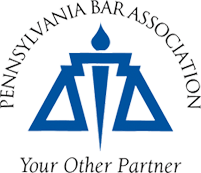
PBA PRESIDENT LAUDS RENDELL VETO OF HB 1467 |
HARRISBURG (March 17, 2006) � The president of the Pennsylvania Bar Association today lauded Gov. Ed Rendell�s veto of House Bill No. 1467, which would have created new provisions of law to favor home builders and contractors involved in disputes with consumers over construction defects.
�This legislation clearly would have tipped the scales in favor of builders, at the expense of consumers who may have had valid claims for construction defects,� said PBA President William P. Carlucci. �The legislation would have complicated, rather than simplified, the resolution and litigation of these claims. We are thankful that Gov. Rendell prudently issued a veto of the bill to protect thousands of Pennsylvania consumers.�
Carlucci said the PBA�s Real Property, Probate and Trust Law Section, after reviewing the bill, termed it �bad legislation for Pennsylvania.�
He said defects of the bill included:
- Imposition of penalties against a consumer who rejects a �reasonable� settlement offer, but no corresponding provision for penalties against a builder who rejects a reasonable settlement demand. A consumer who successfully proved a construction defect case against the builder, but was determined later to have rejected a �reasonable� settlement offer, would have been penalized by not being entitled to any recovery he would have otherwise been entitled to for attorney�s fees or litigation costs after the date of rejection, such as those provided by the Pennsylvania Unfair Trade Practices and Consumer Protection Law, 73 P.S. � 201-1 et seq.
- The trier of fact would have determined the reasonableness of a settlement offer, which could have resulted in the addition of a new layer of post-trial litigation to cases involving claims for home construction defects. The presentation of such an issue, to a jury in particular, would have required a considerable amount of additional court time and expense, likely including expert testimony and a second round of discovery. The new area of litigation would have been akin to insurance bad faith litigation following a plaintiff�s verdict in personal injury actions where the verdict exceeds the defendant�s insurance policy limits.
- Many construction defect cases include claims under Pennsylvania�s Unfair Trade Practices and Consumer Protection Law. In these cases, the trial court has the discretion to award between $100 and up to three times the actual damages, plus attorney�s fees and litigation costs, where a violation of the Act has been proven. 73 P.S. � 201-9.2. It would have been unrealistic to expect a jury, even with the aid of expert opinion testimony, to be able to consider the reasonableness of a settlement offer under such circumstances, where a significant factor to be weighed is how a trial judge is likely to exercise his discretion within the wide latitude permitted by the Consumer Protection Law.
|
|
| 